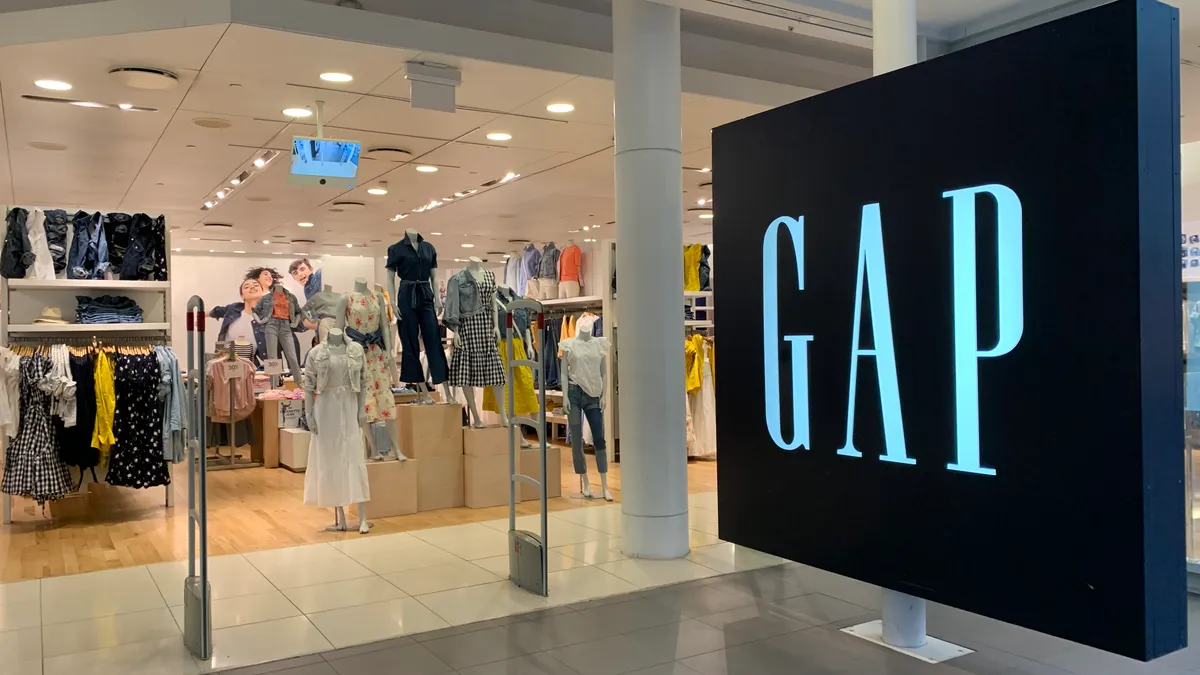UPDATE: June 5, 2020: In a statement emailed to Retail Dive Thursday, Gap Inc. did not remark on the lawsuit per se, but noted that it was forced to close stores due to the pandemic and suspended rent payments then. "It's important to note the profound effect that COVID has had on shopping centers as well, leaving them closed to us and our customers for months," a spokesperson said, adding that the company is pleased with progress in ongoing lease negotiations.
"We remain committed to working directly with our landlords on mutually agreeable solutions and fair rent terms, just as our hundreds of industry and government partners have sat with us in good faith to shape the post COVID business landscape," the spokesperson also said. Later that day company executives told analysts that in some cases where negotiations fail, stores will close permanently.
Dive Brief:
-
Simon Property Group on Tuesday sued Gap Inc. over more than $65.9 million in unpaid rent and other charges, according to multiple media reports. More than 400 Gap Inc. stores are found at Simon properties, according to the reports.
-
In April, Gap Inc. disclosed that it stopped paying rent on temporarily shuttered stores, garnering monthly savings of some $115 million per month in North America alone. The retailer also said it's negotiating with landlords on lease terms, including rent, but may close some stores permanently.
-
In May, Simon Property Group CEO David Simon took a hard line over the issue, telling analysts that, while the company has worked with some tenants to defer rent, they are obligated to pay unless they're in bankruptcy. Neither Simon Property Group nor Gap Inc. immediately responded to Retail Dive's request for comment.
Dive Insight:
The COVID-19 pandemic forced brick-and-mortar stores to shut down in a public health effort to halt the spread of the disease, throttling revenue even as expenses were ongoing.
While several retailers, including Gap Inc., kept store employees on the payroll for at least some of that time and continued to pay some of their bills, they moved to slash other costs, including forgoing rent at locations where making a sale was impossible.
Simon's move to drag Gap Inc. to court over that was probably inevitable, according to Nick Egelanian, president of retail development firm SiteWorks, who has urged landlords and their retail tenants to work to come to terms over their leases. "They pretty much have to sue them to exercise proper fiduciary responsibility," he told Retail Dive in an email. "I suspect it will end up with a negotiated settlement."
David Simon's caveat that only bankrupt retailers can opt out of their rent isn't likely much consolation, considering that the industry's Chapter 11 filings are piling up, most recently from the likes of J.C. Penney, Neiman Marcus and Pier 1. While Simon malls are generally considered top-notch and therefore mostly above the fray, they are hardly immune to the traffic and sales stoppages brought on by the recent store closures, or to the decline of store traffic more broadly.
The precariousness of department stores, which anchor most malls, is also a threat. As those retailers increasingly exit malls — indeed, more than half of mall-based department stores could close within two years — they leave gaping spaces empty and trigger clauses in the leases of inline tenants stipulating lower rents when an anchor leaves.
It's a wrench thrown into what had been a well oiled machine, according to Egelanian. When things are working, consumers, retailers, landlords, suppliers, lenders, bankers and Wall Street are interconnected, he said.
"This is one little sign of how that ecosystem can break down with extended retail closures," he said. "Eventually the interconnections break down and become dominos that fall in succession. This will likely become more and more evident ad the pandemic goes on. And as it occurs it will cause systemic failure that will be worse than the individual failures."















